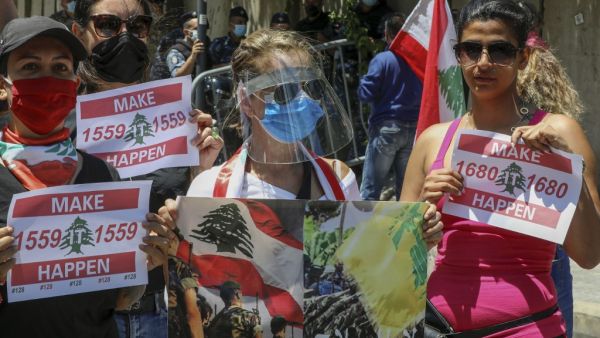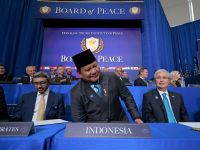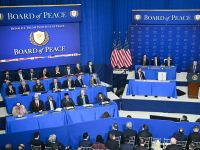The Cabinet is set to approve Thursday a two-week extension of the nationwide lockdown as part of attempts to curb the spread of the coronavirus pandemic, an official source said Wednesday, as authorities planned further steps toward opening the country.
Meanwhile, President Michel Aoun refuted accusations that he was infringing on the Cabinet’s powers, saying he was fully committed to the Taif Accord that ended the 1975-90 Civil War and stipulated equal power sharing between Muslims and Christians. Aoun’s stance came a day after the Future Movement’s parliamentary bloc warned against what it termed “continued infringement” on the powers of the Cabinet and turning it into an institution that has been stripped of constitutional competency.
The Cabinet, which is slated to convene under Aoun at Baabda Palace at 11 a.m. Thursday, will be preceded by a meeting of the Higher Defense Council at 10 a.m., the official source said.
The Higher Defense Council will evaluate the security situation in light of ongoing preventive measures to stem the spread of the coronavirus and make a recommendation to extend the general mobilization period, which expires on June 7, until June 21, the source told The Daily Star.
Once approved by Cabinet, it will be the sixth extension of the general mobilization measures that have been in force since March 15 to contain the spread of virus that has so far infected 1,256 people and claimed the lives of 27.
The source said the Cabinet agenda does not include any administrative appointments, apparently reflecting lingering differences over the names of some candidates to key posts.
Speaking after a Cabinet session chaired by Prime Minister Hassan Diab at the Grand Serail Tuesday, Information Minister Manal Abdel-Samad said discussions on four key administrative appointments that were supposed to have been approved Thursday had been postponed until next week. These include the appointment of a new governor of Beirut to replace Ziad Chebib, whose term expired last month; a new head of the Civil Service Council; a director-general of the Economy and Trade Ministry; and a director-general of investment at the Energy Ministry.
Encouraged by the drop in the numbers of coronavirus infections, the government has largely eased lockdown measures in recent days, allowing most businesses and institutions to reopen while observing precaution measures.
Asked to comment on reports that Beirut’s Rafik Hariri International Airport would reopen on June 21, the official source said: “The Cabinet will take a decision next week on reopening the airport.” The airport suspended all of its commercial and private flights on March 18 in a bid to stem the spread of coronavirus. It opened temporarily in April and May for several flights repatriating thousands of Lebanese stranded abroad due to the COVID-19 crisis.
In line with the Interior Ministry's instructions to ease restrictions, Lebanon edged closer to normal life Monday as more establishments were allowed to reopen and curfew hours were drastically reduced with COVID-19 cases remaining relatively stable.
Despite the odd-even rule for movement of vehicles, Beirut Monday witnessed the notorious traffic jam as more people resumed working from their offices, after having worked from home for the last three months.
Malls, which were previously banned from opening due to the high probability of overcrowdedness, reopened their doors in addition to museums.
The Interior Ministry’s latest memo also ordered curfew hours to be reduced, allowing citizens to be out and about until midnight, a notable change to the previously set 7 p.m. curfew.
During Tuesday’s Cabinet session, Diab said the government could no longer continue to close the country, which is reeling under a crippling economic and financial crisis that has been aggravated by the coronavirus pandemic.
“We are still in a critical stage but we can no longer continue to close the country, as there were some institutions that began to shut down and employees and workers who started to lose their jobs,” Abdel-Samad quoted Diab as saying during the session.
Responding to the Future bloc’s accusations, Aoun said in a statement released by the presidency’s media office: “Some political and media circles every now and then claim that the presidency is ‘infringing’ on the Cabinet’s powers, and attribute to the president exercises they claim are contrary to the Constitution and turn the ruling system into a ‘presidential rule’ by hinting at ‘confiscating’ the prime minister’s role.”
“In the face of these allegations, the presidency’s media office would like to stress that the president is committed to the constitutional oath to safeguard the Constitution and exercise his role according to constitutional provisions which he has never surpassed,” the statement said.
Aoun called on those accusing him of encroaching on the prime minister’s powers to provide facts and documents to show when and how violations of the Constitution happened.
“The president is determined to exercise his full powers that fall within the constitutional jurisdiction, nothing more, nothing less. It appears that this determination annoyed those who always hide behind the Taif [Accord] to undermine the president’s powers,” the statement said.
Aoun also rejected accusations that the Cabinet’s role had been fully disrupted. “The Cabinet is exercising its role in accordance with the prerogatives stipulated to it, nothing more, nothing less,” the presidency’s statement said.
A statement issued after the Future bloc’s weekly meeting chaired by former Prime Minister Saad Hariri Tuesday said: “The bloc warns of the deliberate persistence in the political and partisan infringement on the powers of the Cabinet and turning it into an institution that has been stripped of constitutional competence, whose aim is to carry out the agendas of the ruling party and accept decisions, instructions and supreme orders that do no respect the minimum of the Cabinet’s prestige and its position in the political system.”
The bloc said the revival of the Selaata power plant after it had been voted down by all ministers except those of the Free Patriotic Movement in a previous session had “a bad impact on the Lebanese public and many leaders and personalities entrusted with the position of the Cabinet and the premiership who saw in the last session a flagrant example of undermining powers and submitting the Cabinet to the logic of a presidential rule.”
Aoun dismissed accusations that he was overturning against the Taif Accord.
“The president, who has called in his swearing-in speech for the need to fully implement the National Accord Document [Taif Accord] without selectivity, is committed to this document to protect the national partnership which is the core of our system and unique entity,” the presidency’s statement said.
Declaring that making allegations has become “boring,” the statement said the Lebanese are yearning for cooperation among various branches of power to emerge from the “severe circumstances through which the country is passing.”
“The first and most important step is by unifying stances to restore stability to political life and this cannot be achieved except by respecting the [National] Pact, the Constitution and laws,” the statement added.
This article has been adapted from its original source.








